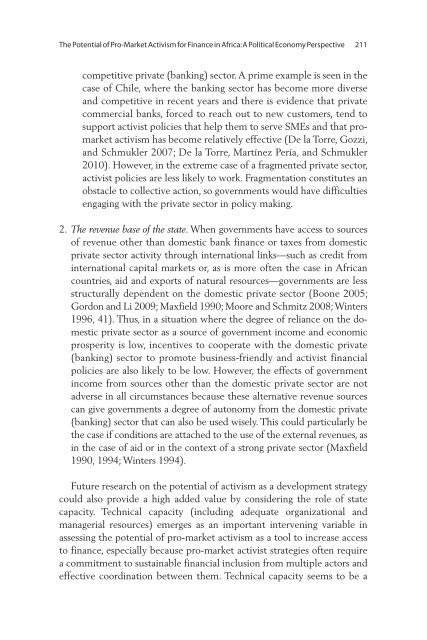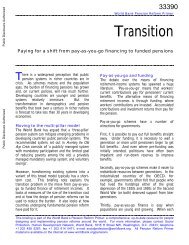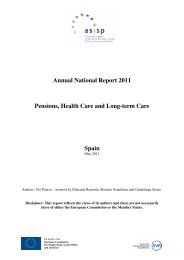Financial Sector Development in Africa: Opportunities ... - World Bank
Financial Sector Development in Africa: Opportunities ... - World Bank
Financial Sector Development in Africa: Opportunities ... - World Bank
You also want an ePaper? Increase the reach of your titles
YUMPU automatically turns print PDFs into web optimized ePapers that Google loves.
The Potential of Pro-Market Activism for F<strong>in</strong>ance <strong>in</strong> <strong>Africa</strong>: A Political Economy Perspective 211<br />
competitive private (bank<strong>in</strong>g) sector. A prime example is seen <strong>in</strong> the<br />
case of Chile, where the bank<strong>in</strong>g sector has become more diverse<br />
and competitive <strong>in</strong> recent years and there is evidence that private<br />
commercial banks, forced to reach out to new customers, tend to<br />
support activist policies that help them to serve SMEs and that promarket<br />
activism has become relatively effective (De la Torre, Gozzi,<br />
and Schmukler 2007; De la Torre, Martínez Pería, and Schmukler<br />
2010). However, <strong>in</strong> the extreme case of a fragmented private sector,<br />
activist policies are less likely to work. Fragmentation constitutes an<br />
obstacle to collective action, so governments would have difficulties<br />
engag<strong>in</strong>g with the private sector <strong>in</strong> policy mak<strong>in</strong>g.<br />
2. The revenue base of the state. When governments have access to sources<br />
of revenue other than domestic bank f<strong>in</strong>ance or taxes from domestic<br />
private sector activity through <strong>in</strong>ternational l<strong>in</strong>ks—such as credit from<br />
<strong>in</strong>ternational capital markets or, as is more often the case <strong>in</strong> <strong>Africa</strong>n<br />
countries, aid and exports of natural resources—governments are less<br />
structurally dependent on the domestic private sector (Boone 2005;<br />
Gordon and Li 2009; Maxfield 1990; Moore and Schmitz 2008; W<strong>in</strong>ters<br />
1996, 41). Thus, <strong>in</strong> a situation where the degree of reliance on the domestic<br />
private sector as a source of government <strong>in</strong>come and economic<br />
prosperity is low, <strong>in</strong>centives to cooperate with the domestic private<br />
(bank<strong>in</strong>g) sector to promote bus<strong>in</strong>ess-friendly and activist f<strong>in</strong>ancial<br />
policies are also likely to be low. However, the effects of government<br />
<strong>in</strong>come from sources other than the domestic private sector are not<br />
adverse <strong>in</strong> all circumstances because these alternative revenue sources<br />
can give governments a degree of autonomy from the domestic private<br />
(bank<strong>in</strong>g) sector that can also be used wisely. This could particularly be<br />
the case if conditions are attached to the use of the external revenues, as<br />
<strong>in</strong> the case of aid or <strong>in</strong> the context of a strong private sector (Maxfield<br />
1990, 1994; W<strong>in</strong>ters 1994).<br />
Future research on the potential of activism as a development strategy<br />
could also provide a high added value by consider<strong>in</strong>g the role of state<br />
capacity. Technical capacity (<strong>in</strong>clud<strong>in</strong>g adequate organizational and<br />
managerial resources) emerges as an important <strong>in</strong>terven<strong>in</strong>g variable <strong>in</strong><br />
assess<strong>in</strong>g the potential of pro-market activism as a tool to <strong>in</strong>crease access<br />
to f<strong>in</strong>ance, especially because pro-market activist strategies often require<br />
a commitment to susta<strong>in</strong>able f<strong>in</strong>ancial <strong>in</strong>clusion from multiple actors and<br />
effective coord<strong>in</strong>ation between them. Technical capacity seems to be a







